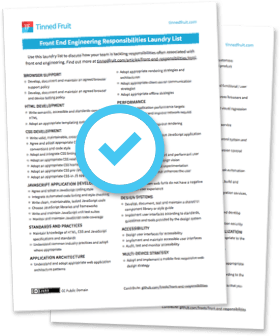Product and agency work isn't so different
In a previous role as a hiring manager for product engineers, we often made the distinction between candidates that had long-term product development experience, and those that didn’t.
If a candidate has only ever worked in an agency, we assumed that their working style would be geared towards short-term thinking. That they wouldn’t have the experience necessary to work on long-term incremental product development.
But the assumed difference between these two modes was never really detailed. We might have raised concerns that a candidate was a ‘starter’ and not a ‘finisher’. Or we might have worried that they were the sort of person that hacked in a solution, rather than finding something that will stand the test of time.
But realistically, and honestly, this is unfair bullshit. We got this wrong. Some of our best and most capable people came from agency backgrounds.
A focus on sustainability or on short-term gain is not a personal characteristic.
And neither is it a given based on the type of business that’s being run.
It’s more a function of driving business forces at the time. For agencies, many things can motivate the way that a product is developed. Is it an MVP with the aim of seeking proof of market acceptance? Or has the agency been tasked with redeveloping a successful product for long-term sustainability?
The measures of success in these endeavours are different, and require different approaches. It isn’t because they are an agency. Agencies shouldn’t be working in identical ways for each project that comes along.
Similarly, in-house teams are not protected from short-term thinking, just because they intend to be working on a product for the long-term. Working in product companies can often feel more like working on a series of projects, each with a motivating short-term or long-term goal. Again, it’s the goal that determines the working style.
Agency or product company, the challenge more often is that there is a bias to short term gain. Whether it’s closing the sale to a big prospect with a custom bit of functionality, or a partnership deal, or a seasonal marketing promotion. Short term goals keep cropping up. There is a never ending parade of them.
But they are not necessarily distractions either. In many cases they can keep the doors open, and allow work on longer-term goals to continue. Larger product companies cotton on to this pretty quickly, and may split teams according to short and long-term aims. An example is a ‘growth’ team that tends to focus on marketing automation and support, separated from a ‘platform’ team with the aim of restructuring the back end architecture.
Much of the skill in product management and development is balancing these short-term and long-term concerns. It is a matter of process, communication, alignment and shared problem solving. Not an individual characteristic or preference.
So take it from me - please don’t treat candidates from agencies as less-well equipped to work on products for the long-term, like they’re some separate breed of flighty gadfly. The skills they’ve developed to do good work are valuable in product companies too.
Let’s not kid ourselves that product companies work only on long-term goals, and only produce sustainable work. The reality is, we hack stuff in to get stuff done. We should be motivated to avoid this, because we know that we’ll also be the ones that have to live with the inevitable technical debt. But of course we don’t.
All the best,
– Jim
